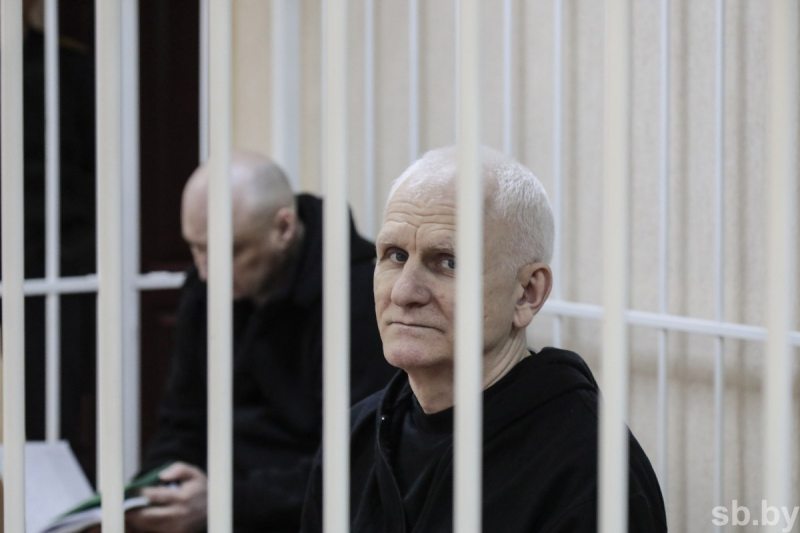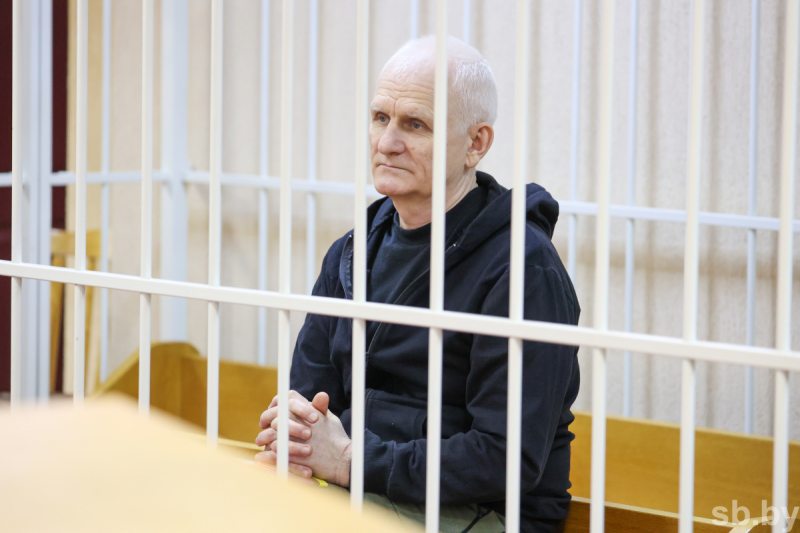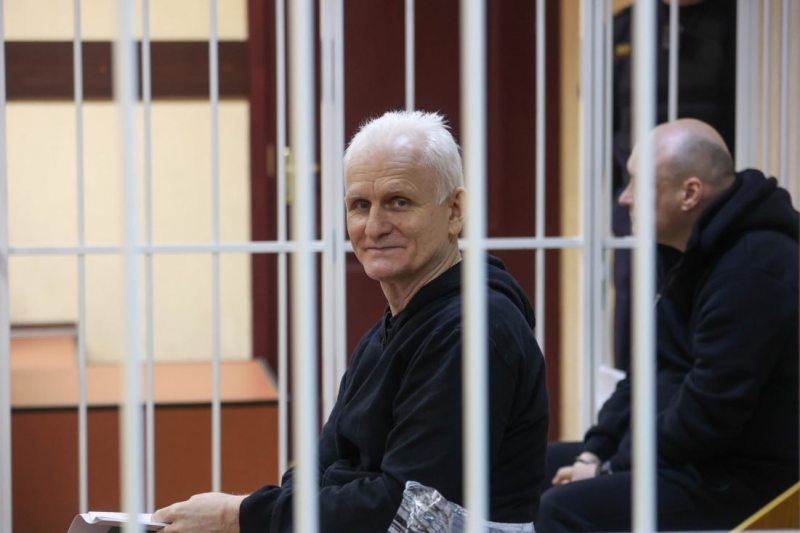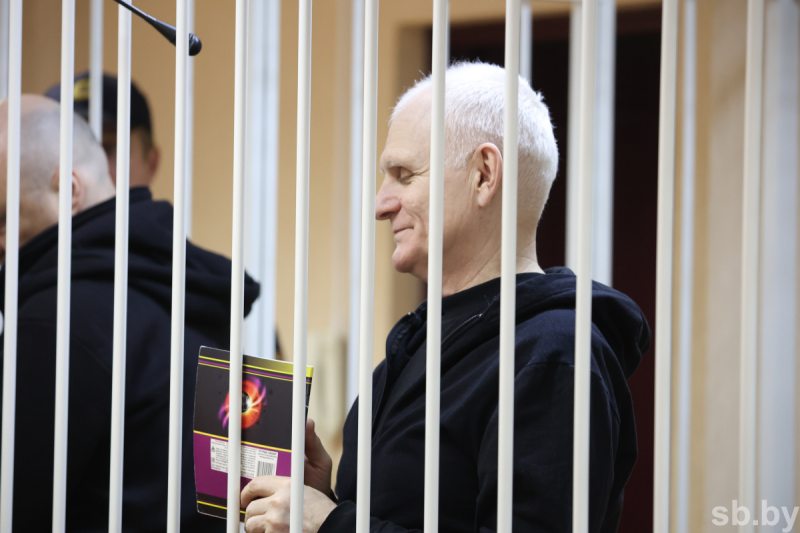"When the prosecutor demanded 12 years of imprisonment, Ales’s face remained calm". Portrayal of Ales Bialiatski in court
On 3 March, at 12 pm the Leninsky District Court of the city of Minsk passed judgement on Viasna’s human rights defenders: the winner of the Nobel Peace Prize and the founder of the organisation Ales Bialiatski, his deputy and the Vice President of the International Federation for Human Rights Valiantsin Stefanovic, the coordinator of the Human Rights Defenders for Free Elections campaign and lawyer Uladzimir Labkovich, and Dzmitry Salauyeu who is being charged in his absence. The prosecutor has demanded the sentence from 9 to 12 years of imprisonment for the allegations "financing of the protests" in 2020 and "smuggling of cash in an organised group" from 2016 to 2021. One of the court attendants - who would like to remain anonymous - has agreed to share their observations. Here’s the portrayal of Ales Bialiatski.
"He knew he would be arrested for his work that has been supported and appreciated by civil society worldwide"
Ales Bialiatski may be called a powerhouse of the human rights movement who is surrounded by numerous friends, but don’t ignore a number of enemies waiting for the right time to strike a blow. As for Ales, in the long years of protecting human rights he proved to be the embodiment of wisdom and good judgement. He is a Person with a capital "P" who is extremely compassionate, always ready to listen to you, give wise advice or even offer help.
Just to remind us, this is not the first imprisonment for the human rights defender. In 2011, Bialiatski was sentenced for tax evasion to four and a half years of imprisonment, of which he served 1,052 days, more than 2.5 years. Belarusian authorities released him ahead of time to mend their relations with the European Union and the USA. The inner strength that Ales has becomes evident for everyone - after being released from the prison camp, not only did he refuse to leave the country, but resumed his human rights activities in the authoritarian country.
Being detained for the second time, Ales Bialiatski, yet again, remained true to his moral principles and values. The year preceding his arrest on 14 July 2021 was marked by a severe crisis of human rights in Belarus caused by the rigged presidential election in August 2020, arbitrary detentions of political opponents and tortures of peaceful protesters who demanded that their voice should be heard by the authorities.
Ales Bialiatski knew he would be arrested for his work that has been supported and appreciated by civil society worldwide. Being perfectly aware of all risks and dangers, the human rights defender was "bundling" his colleagues out of the country on the pretext of business trips, while choosing for himself to take the fight against the repressive system that Aliaksandr Lukashenka has been building up for almost three decades.
"Court attendants together with lawyers have to go through the metal security gate"
By the time the trial on the Viasna case started, independent journalists and most civic activists had been forced out of Belarus. There is a high risk of being detained if you want to attend high-profile open court hearings. Scientists, lawyers, doctors, politicians, IT specialists, businessmen, priests, journalists and sportsmen have been thrown into prisons for their involvement in civic activities. During the preliminary investigation against Viasna’s activists that lasted 18 months, the Belarusian authorities reached a juncture of aligning with Russia in the ongoing war in Ukraine.
‘Twenty months after seeing Ales Bialiatski last time, I managed to get to the court hearing in the Viasna’s case and see him again. The unprecedented security measures taken by the administration show how sacral the issue of legitimacy in the eyes of the international community is for the Belarusian authorities. They are very sensitive about any unbiased, fair and objective critical comments addressed to the country’s senior officials who deliberately violate human rights in the periods of electoral campaigns.
Here I am, passing by patrol officers with a loudspeaker who are on guard near the House of Justice. At the entrance to the building, two policemen are keeping record of those who came to attend a court hearing in the case of "smuggling and protests financing", writing down their full names, dates of birth and citizenship. However, law enforcement officers don’t put journalists representing the state media on the list. Interestingly enough when no court hearings in the case of human rights defenders are held, such security measures are not applied in the court building.
Immediately before entering the courtroom, members of the audience and defense lawyers have to go through the metal security gate, upon which they are made subject to personal search. The courtroom secretary is keeping their own list of those present, and in the event of a newcomer, asks about their relations with the defendants. During the hearing, the vigilant courtroom secretary, first, by exchanging glances with the security guard, and then through a mobile phone, instructs him to ask the member of the audience, who put his cellphone on the back of the seat and turned on audio recording, to move the phone down to the seat , because "otherwise he may be suspected of doing video records, which is prohibited".
"The depression you live with because of the situation in the country vanishes when you look into Ales Bialiatski’s eyes"
Ales Bialiatski, with his kind and friendly smile, meets his lawyer, exchanges a few words with him, and sits down on the wooden defendants’ bench, handcuffed, but full of inner peace and confidence. Here comes the moment when, for the first time in a while, I am able to see Ales, catch every emotion crossing his tired face, every movement of his hands locked in handcuffs, and then to hear his energetic voice.
The depression you live with because of the situation in the country for last two and a half years vanishes when you look into Ales Bialiatski’s eyes; he gets up off the bench and you can see how the face of a sombre grey-haired man brightens with cheerfulness, warmth, surprise and interest when he tries to cast a look from behind a broad-shouldered security guard and greet somebody he knows. The kind eyes, the wholehearted smile and the boyish enthusiasm of Ales illuminate the entire courtroom.
This moment changes your state of mind because the response you see from Ales Bialiatski overshadows all the threatening surroundings, while his emotions make your conscience melt the metal cage sized three by two metres and the four security officers guarding it. You have to fight the urge to start waving a hand in greeting or you risk being arrested and miss the next hearing. There are strict rules applied in the courtroom and compliance with them is controlled not only by security guards and the courtroom secretary but also by officers in plain clothes.
"By making references to the history, Ales makes the charges an object of ridicule"
Ales Bialiatski is a man of knowledge and culture with a sophisticated sense of humour. While disclosing the written materials of the criminal case, when the prosecutor reads out the data from the passenger traffic system about the one-day trips of Ales Bialiatski to Vilnia, the human rights defender comments:
"I would like to note that, for 600 years, Vilnya was our capital as well and going to Vilnya is a tradition followed by all our ancestors across all generations. In 1980s, when we were students, we went to Vilnya to have coffee in the morning. Therefore, those one-day trips may seem somewhat strange to you, who are prohibited to leave Belarus for unfriendly states, while for ordinary citizens, for Belarusians, this is a normal tradition".
In such a diplomatic and polite way Ales Bialiatski is mocking at the ignorance of the minions of law who present piles of prosecution paperwork trying to argue that those trips were the way to bring cash to Belarus which was later applied to support protest actions.
Ales Bialiatski, very subtle in his ironic attitude to the billing data collected by investigators and presented before the court by the prosecutor in relation to his colleague Viktar Sazonau from Grodna, addresses the judge: "I could elaborate on this". The judge replies: "Keep to the point, please!". Bialiatski goes on:
"Sazonau is a Belarusian writer. This is information for those who are not familiar enough with Belarusian culture. He wrote a number of stories in Belarusian. He was a member of the Union of Writers of Belarus and he is an author of a book called "Memoirs of a smuggler". I guess, the contents of the book have not yet been properly investigated".
The stance taken by Ales Bialiatski towards prosecution and the discontent of the judge saying "Can you keep to the point, Bialyatski? Bialiatski, can you explain what it has to do with the case materials?" show the sum and substance of the discourse where education and intelligence are fighting against ignorance, culture is opposed to total lack of culture, respect for rights stands against violation of law, and light struggles against darkness.
In his comments on the data of the mobile operator about the locations of his phone number, including his summer house in Rakau, 40 km away from Minsk, Ales Bialiatski, who has comprehensive knowledge of the history of his country, explains:
"The town of Rakau, which was mentioned here, used to be, in 1920s’ and 1930s’, the capital of smugglers coming from that side of the border. Could it be that investigators and the prosecutor's office were not thorough enough when studying my visits to Rakau? Is it possible that my presence there was for a reason and somehow connected with the fact that it had been the capital of smugglers?!".
"The Belarusian language is an integral and organic part of being a Belarusian"
During the court hearing, Ales Bialiatski is sitting on the defendants’ bench keeping his back straight as a symbol of his unbroken spirit and his confidence in the rightness of his cause. Because of his upright posture, Bialiatski, who turned 60 in autumn, looks brave even amid his younger colleagues.
Those who have known Ales Bialiatski for a long time find his appearance unusual looking at him in the metal cage, handcuffed and closely guarded by security staff in armoured vests. Always dressed modestly and with a touch of style, the human rights defender is now sitting on the defendants’ bench in a black hoodie and track pants. During the hearing, the human rights activist keeps coming right up to the cage bars when his lawyer shows him the contents of the criminal case volumes which he hadn’t had time to read through before. Ales Bialiatski uses glasses to take a look at the written materials. These glasses look unusual on him as I have never seen him in glasses outside the prison. When there was something to read on a cell phone, he always got along without them, looking at the screen with squinty eyes. The necessity to use glasses is evidence of the appalling conditions the Nobel Prize winner has to experience in the damp basement cell of the two-hundred-year-old Pishchalovski Castle located in the centre of the Belarusian capital. The prisoner kept in the castle is deprived of the required insolation and fresh air, walks and physical activity, while the stressful situation takes a heavy toll on the eyesight of the man who is often called the conscience of the Belarusian nation.
At one of the hearings, Ales Bialiatski raises strong objections to both the criminal case and the degrading conditions in which the human rights defenders from Viasna have been held for 555 days. All objections are delivered by Ales Bialiatski in the melodic Belarussian language which sounds so rich and diverse when coming from him. At the court proceedings, Bialiatski makes the most use of his native language derived from his background and his Belarusian genes. For Ales, the Belarusian language is an essential and intrinsic aspect of his Belarusian identity. Its melodic tones and varied expressions facilitate his communication of ideas, sentiments, convictions, and logic.
As the prosecutor referred to the punishment given to Viasna's founder, Ales maintained calm
Having spent over eighteen months at the pretrial detention facility, Ales Bialiatski, though handcuffed, retains the zest for life worth admiring. One day, with the judge and court officials not yet back to the courtroom to resume the hearing after the lunch break, he snatches a moment when the security guard does not obstruct his view of those present and, catching the eye of an acquaintance, raises his handcuffed hands and runs them twice up his chin with short touches sending a wide smile and, in this way, showing that he approves of his new image.
Despite the prosecutor's demand for a 12-year prison sentence for the founder of Viasna, Ales remained composed and unfazed, exhibiting remarkable resilience and fortitude in the face of repression. Given his age and the harsh conditions of Belarusian colonies reminiscent of Stalin's Gulag, the 60-year-old man may be facing a sentence that could effectively amount to life imprisonment. Nonetheless, Ales demonstrated unbroken spirit and stoicism throughout the proceedings.
Ales Bialiatski is a man of great wisdom who is able to rise above the circumstances and never spares himself in protecting wholeheartedly those sitting beside him on the defendants’ bench – a rare quality which, to a great extent, makes him the opinion leader. Thus, throughout the court proceedings, the human rights defender has appealed to the criminal case materials which were read out and asked to present at least one piece of evidence proving the criminal nature of the activities performed by his colleagues and himself. This is the quality of a high-minded person which also manifests itself in his final statement delivered by him before the court retired to the deliberations room. Ales Bialiatski has compiled a list of societal groups and professions that have been subjected to the oppressive machinery in Belarus. He urges the initiation of a comprehensive societal dialogue focused on national reconciliation.
"The human rights defender's concluding statement is infused with a desire to safeguard the values and principles that he embodies to the fullest extent"
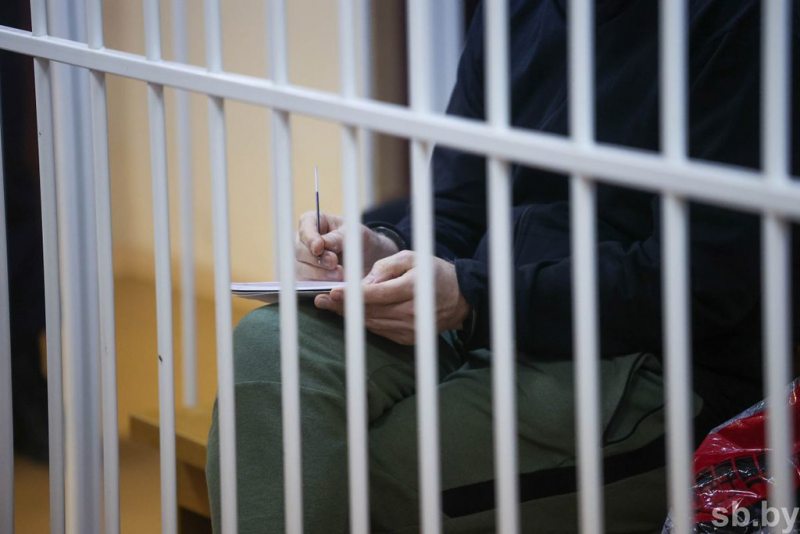
In his final statement, Bialiatski refused to dignify the false charges against him, seeing the trial as a sham. He knows the judicial system is rigged and ready to break anyone who challenges the regime's politically motivated frame-ups. Bialiatski pointed out that during his detention, professional communities he belonged to were banned, and his lawyers faced severe retaliation, including imprisonment and disbarment. This unfair treatment exposes the state's battle against human rights defenders. Bialiatski's words may not sway the judge's sentencing decision, but they embody his values: a society free from repression, a democratic state, and a government that prioritises national interests. His vision centres on human rights and freedoms as the ultimate values and state objectives.
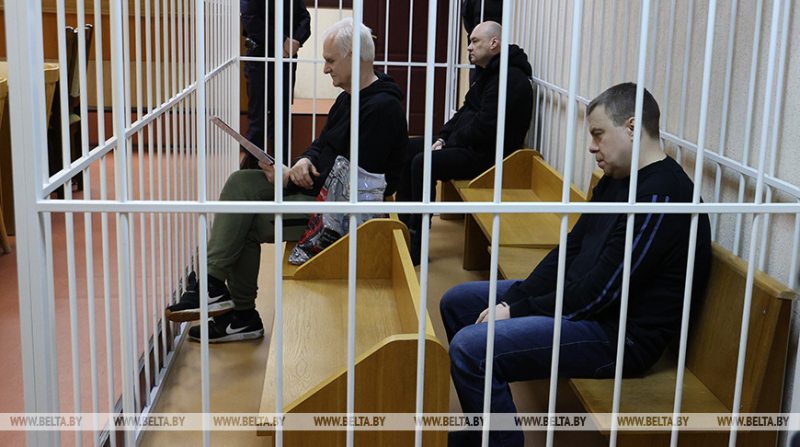
What Bialiatski, Stefanovic, and Labkovich said in their last word in court: full translation of their speeches



